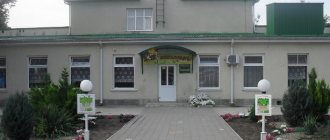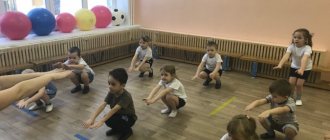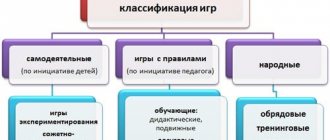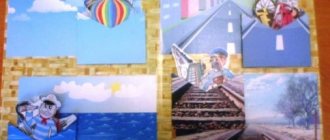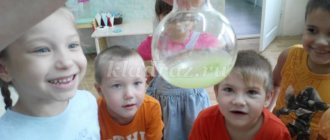MAGAZINE Preschooler.RF
Consultation for teachers “Organization of work with gifted children in preschool educational institutions”Khanty-Mansiysk Autonomous Okrug-Ugra Oktyabrsky district village settlement Unyugan Municipal budgetary preschool educational institution "Kindergarten of general developmental type "Fairy Tale"
The material was prepared and implemented by: Oksana Vasilievna Klyueva, educational psychologist 2021
“There are invisible strings in the soul of every child. If you touch them with a skillful hand, they will sound beautiful . V.A. Sukhomlinsky
Children's talent is one of the most mysterious phenomena of nature, arousing increased interest and admiration from others. Society needs people with extraordinary thinking and a creative approach who can make a valuable contribution to the development of humanity. Therefore, a child with a high level of development and cognitive activity requires special attention from preschool teachers.
A gifted child is noticeably different from most of his peers in his special curiosity: he shows increased attention to the world around him, quickly answers the teacher’s questions, experiments with objects, composes and tells fairy tales and unusual stories, is interested in playing with construction sets, asks many questions and has a large vocabulary. A child’s abilities are always manifested in activity, and can only be revealed in specific activities, the process of which gives the child pleasure - music, drawing, mathematics and other fields.
In this regard, teachers must organize the educational process in such a way as to identify children with creative and innovative thinking, support and develop their abilities within the framework of preschool education. To do this, preschool teachers need to conduct an initial diagnosis and subsequent examinations. Analysis of the results of the research helps in applying a differentiated approach to education, identifying gifted children and assessing the quality of the teaching methods used. Based on the results, the level of development of the preschooler is determined.
Gifted children in preschool educational institutions: areas of child giftedness
Each child with increased mental abilities is individual, with his own interests and preferences, with a craving for a certain type of activity. The following areas of a child’s giftedness are distinguished:
- Intellectual sphere: the child is distinguished by sharp thinking, excellent memory and special attentiveness, shows curiosity and increased interest in learning, competently expresses thoughts and ideas
- Academic sphere: the child has a strong desire to read, has an extensive vocabulary, excellent understanding of the material and its assimilation; the child shows interest in mathematical tasks and easily performs calculations
- Creative sphere: the child is highly productive and inventive in educational and gaming activities, generates original ideas and has his own ideas, can apply different approaches to assigned tasks
- Communication sphere: the child is self-confident, easily finds a common language with others, takes initiative in communicating with peers, takes responsibility in making decisions, shows leadership qualities
- Artistic sphere: the child shows interest in visual sources of information, is interested in drawing and modeling, his creativity is original
- Musical area: the child shows interest in musical activities, reacts sensitively to musical works, and is able to produce short rhythmic passages
- Physical: The child enjoys physical activity, performs tasks that require fine and precise motor skills, and has good hand-eye coordination.
The tasks of a preschool teacher in teaching gifted children
Based on the requirements for creating favorable conditions for teaching gifted children, preschool teachers must have a developed training program.
The goals of the program are to identify, support and develop children with increased intellectual abilities. Gifted children need an individual education program, which is why preschool teachers must undergo special professional training.
When working with gifted preschoolers, preschool teachers are recommended to use innovative pedagogical technologies, improve the scientific and methodological base, collaborate with children's public organizations and exchange experience with other teachers at the municipal and regional level. The teacher must have a high psychological level to work with gifted children, without putting pressure on the child if he wants to do something his own way and is unable to follow accepted norms. Preschool teachers should be more attentive to gifted students so that children feel needed and in demand. It is necessary to increase the child’s mental load by introducing interesting facts and integrated tasks and games, thereby encouraging and developing the child’s cognitive activity. Stimulation of the preschooler is also important: honor boards, intellectual games and competitions, awards. At the slightest failure, self-esteem drops sharply, since a gifted child has increased demands on himself and a desire for perfectionism. But upon achieving a certain success, the self-esteem of a gifted child increases to such an extent that it develops into superiority over others. Preschool teachers should pay attention to the psychological characteristics of a gifted child and help him develop social and communication skills and build relationships with peers, as well as adults.
Project method in teaching gifted children in preschool educational institutions
Gifted children need exploratory activities that allow them to immerse themselves in creative learning, develop a thirst for knowledge, and strive for discovery and self-knowledge. The project method used in the classroom is ideal for realizing the cognitive interest of preschoolers and developing their creative and mental abilities. Taking into account the level of giftedness and the range of interests, the child is asked to complete a project: through research, find a solution to the problem and summarize the results, expressing his point of view to the public. This form of education provides a gifted child with the opportunity to study with peers and be in a familiar social environment, while expanding their abilities and enriching their knowledge. When completing project tasks, the teacher plays the role of a consultant, helps and supports the child in completing tasks. After all, the main task of the teacher is to help the child manifest and develop his abilities.
Experienced preschool specialists use four main teaching strategies when working with gifted children:
- "Acceleration" strategy . Takes into account the needs of children with an accelerated pace of development
- Strategy "Deepening" . For children with increased interest in a certain area of activity, it provides for in-depth study of the subject
- Strategy "Enrichment" . Organizing basic educational and gaming activities in such a way that children have additional time to pursue their hobbies
- Strategy "Problematization" . Stimulating the personal development of preschool children by searching for non-standard and alternative explanations and revising existing information. Often this strategy is not used independently and is part of the “Enrichment” or special educational programs.
Organization of work with gifted children in preschool educational institutions
How to identify gifted children. To identify gifted children, it is necessary to conduct a diagnosis and fill out a gifted child card.
To do this, use the observation method, study their psychological characteristics, speech, memory, thinking. Gifted children have higher intellectual abilities, receptivity to learning, and creative abilities than other children. Cognitive activity dominates in them. They experience joy from acquiring knowledge and from mental work.
What mistake to avoid. The teacher’s task is not to identify who is more gifted and who is less. You need to provide opportunities for the development of children with different talents.
What are the categories of gifted children?
- Children with accelerated mental development. They stand out sharply for their high level of intelligence. Such children will be especially noticeable in primary school. They have a pronounced cognitive activity.
- Children who have generally normal intelligence, but have a special affinity for a particular field of science or technology.
- Children with individual signs of extraordinary abilities. They are not ahead of their peers in the general development of intelligence and do not show remarkable success, but they may have extraordinary memory, a rich imagination, or special powers of observation that have not yet found application.
What are the age-related characteristics of the manifestation of cognitive activity?
Early age (up to 3 years):
- exploratory search activity;
- sensitivity, or sensitivity, to the novelty of a stimulus;
- the ability to discover something new in the ordinary;
- high curiosity.
Junior and middle preschool age (3–5 years):
- raising questions and problems independently;
- research and an inquisitive mind;
- identifying relationships, causes and effects.
Senior preschool age (6–7 years):
- problematic;
- openness to new things;
- search for inconsistencies and contradictions.
Giftedness presupposes flexibility of thinking. This is a property of creative thinking, thanks to which a child can vary the ways of solving problems. Flexibility of thinking can begin to be developed in children from the age of 4. At the age of 5–6, this skill is actively developing, but in order for this process to continue, attention must be paid to it. If you use ready-made templates for solving problems in classes with children, then creative abilities will not develop.
What are the techniques for developing creative thinking?
1. Combinatorial tasks: “In how many ways can you make a four-color flag from horizontal stripes if you have four different colors” ?
Such tasks can be proposed when children have already developed the concepts of “some” , “each” , “part” , “whole” , “set” , “elements of a set” , etc.
2. Tasks on identifying various features of objects: “What are the similarities and differences between the objects “table” and “chair”?” , “What can you say about watermelon?” , “What is white and fluffy?” .
3. Practical tasks for making figures from sticks: “Build five squares, using six sticks .
4. Getting to know tables and diagrams: “Which figure should be placed in an empty cell?” .
5. Exercises for the development of creative abilities in children: “Name as many options for using an ordinary sheet of paper as possible” , “Complete 10 identical circles, turning them into various pictures” , “Select definitions for various words” , “Game “What do they have in common?” ”” , “Exercise “What can be made from?...”” , “Task “Invent and depict”” , “Create fairy tales on a certain topic, modification of fairy tales, etc.” , “The Game “Good-Bad”” , “What could it be?” .
What qualities does a teacher need to develop creative abilities in children?
- Personal: positive self-concept, determination, maturity - clear awareness of one’s goals and objectives, emotional stability, sensitivity.
- Professional: knowledge and skills that help in the development of each child. Knowledge and skills that contribute to the development of general and special talents in children. Ability to identify gifted children; choose the optimal forms of training for them; develop and individualize educational programs, evaluate the effectiveness of training, advise gifted children and their parents.
- Behavioral: listening skills, creating a favorable atmosphere, using questioning techniques. At the level of interpersonal relationships: the teacher receives satisfaction from communicating with children as interesting people and allows himself to be taught.
Recommendations for teachers and parents on raising gifted children:
- Help the child make independent decisions, without direct instructions or instructions
- Encourage expressions of initiative and interest
- Use the difficulties that have arisen as an area to apply previously acquired skills
- Help your child acquire knowledge and manage skills
- Support the child in adapting to the social environment of the preschool educational institution
Adults who are surrounded by a gifted child must have a stable psyche, since excessive emotional delight or, conversely, distrust towards the child can lead to a halt in the development of abilities. Preschool teachers should conduct regular consultation conversations with parents, helping them better understand their child and realize his potential.
The work of a preschool teacher with gifted children means constant development, personal growth, replenishment of knowledge in the field of psychology and means of teaching gifted children, exchange of experience with other teachers and educational psychologists, as well as close communication with parents of gifted students. Teachers and parents must unite in creating and maintaining favorable conditions for the development and embodiment of the creative potential of gifted children.
In other words, it is necessary to emphasize that it is necessary to prepare fertile soil for all children without exception, that is, to maximally develop the skills, abilities, cognitive and creative abilities of children. A gifted child needs a gifted teacher.
Talents are difficult to recognize, not everyone can believe in them. Talents must be nurtured, they must be developed, they must be believed in.
Anyone who is understanding can recognize a simple truth: Talents can be nurtured by a Mentor if he himself is talented
| Next > |
Features of the work of a preschool teacher with gifted children and their parents
In artistic activity, a gifted child manifests himself earlier than in other areas (up to a year and a little later): he begins to draw early, spends a lot of time sculpting and designing, has his own style of depiction;
In the motor sphere, giftedness manifests itself in the form of good hand-eye coordination; the child is unusually dexterous, strong, and coordinated (these are children who are potentially gifted in dancing and sports).
Absolutely all gifted children experience a great need for mental stress and high mental activity.
The main tasks of accompanying gifted children in kindergarten are the following:
Creating conditions for the development of a gifted child. This problem is solved by means of research, development, methodological, and organizational work.
Creating conditions for the development of the subject position of a gifted child. This problem is solved by means of interaction in the teacher-child-parent system.
Tracking the developmental characteristics of a gifted child at various age stages of preschool childhood. This problem is solved mainly by means of pedagogical and psychological diagnostics and developing pedagogical activities.
Problems of gifted children
Lack of interest in group activities
This attitude often appears because the program designed for the average child is too simple, boring and uninteresting for the “gifted”.
Difficulty communicating with peers
Gifted children like complex games and are not interested in those that their classmates are interested in. As a result, a gifted child prefers to play alone and avoids emotional and social contacts with children.
Denial of social norms and general group rules
Gifted children do not strive to “be like everyone else” and reject standard requirements, especially if these standards run counter to their interests.
Dive into philosophical problems
It is common for gifted children to think about such things as death, the afterlife, religious beliefs, and philosophical issues. This can lead to excessive shyness and exaggerated fears.
The pursuit of excellence
Gifted children are characterized by an internal need for perfection. Hence the feeling of dissatisfaction, personal inadequacy and low self-esteem.
Need for adult attention
Due to the desire for knowledge, gifted children often experience an increased need for communication and attention from adults. This causes friction in relationships with other children. Gifted children are often intolerant of children who are inferior to them in intellectual development. They may alienate others with remarks that convey contempt or impatience.
IDENTIFICATION AND PEDAGOGICAL SUPPORT OF GIFTED CHILDREN IN PRESENTER CONDITIONS
Involving the child in project activities, which involve not only analyzing possibilities, but also choosing ways to solve a problem. At the same time, a prerequisite for successful implementation is pedagogical support at every stage of work.
Discussion of the child's daily responsibilities that he will have to perform in the group (for example, watering flowers or another type of activity that is interesting to the child). This will allow him to feel his own importance, the need to participate in the life of the group.
Emotional support, verbal encouragement for success and non-standard problem solving will allow the child to feel more confident.
Involvement in research activities through solving experimental problems will solve the problem of maintaining and developing cognitive interest.
The tasks of educators in working with parents of children with signs of giftedness
[4], [5]
:
Know the external manifestations of giftedness (high intelligence, curiosity, research activity, early passion for any activity, high cognitive activity). This will protect you from the possibility of erroneous identification of giftedness, the so-called. “false giftedness” (verbalism, high level of mechanical memory, artificial provocation of giftedness, one-sided (compensatory) giftedness).
Promote the importance of the leading activity - games. Convince parents not to replace play with “school” teaching methods, play together with the child - support the development of the game, create conditions for the development of new stories.
It happens that a child from 3-4 years old is drawn to learning letters, numbers, reading, etc. The ways to realize a child’s potential must not be closed. Help parents conduct independent studies with their child (reading, mathematics, drawing), using your methodological knowledge.
Convince parents of the need for an adequate attitude towards giftedness:
— create conditions for the child’s creative development (for example, in club activities)
- support and encourage creative creations (arrange exhibitions,
discussions), products of self-expression of the child, as well as a craving for art, sports (visit museums, theaters, exhibitions, competitions)
- be more careful with critical remarks, be tolerant and understanding of the child’s point of view
- develop the child’s communication skills, ensure compliance with the norms and rules of social life
- develop “flawed” qualities (emotionality, motor skills, etc.).
* Frequent displays of giftedness[6]:
Physical and neuropsychic development is ahead of age;
The child began to walk and talk earlier than his peers;
Gifted children in kindergarten
Anastasia Doroshenko
Gifted children in kindergarten
Gifted children in kindergarten.
A little artist whose paintings are admired by the whole world. A little mathematician adding and multiplying huge numbers in his head. A small athlete with great achievements, who just recently took the first uncertain steps in his life. A little musician who soulfully performs complex works, sometimes inaccessible even to adults.
In preschool childhood , there are as many types of giftedness as there are types of children's activities . Each activity has its own scale of success and originality of achievements. Children's talent begins to manifest itself from a very early age. But will a gifted personality ? After all, signs of giftedness that appear in preschool age may gradually fade away if appropriate conditions are not created that stimulate the development of giftedness . Therefore, preschool teachers should be especially attentive to children who are beginning to show the beginnings of giftedness .
Giftedness is most often interpreted as a qualitatively unique combination of abilities that ensures the successful implementation of activities. This individual psychological feature is characterized as a systemic quality of the psyche that develops throughout life, allowing one to achieve high results. A gifted child is a child distinguished by obvious, sometimes outstanding achievements (or having internal prerequisites for such achievements)
in one or another type of activity, the intensity of expression and brightness of which distinguishes him from his peers.
But a gifted child is often particularly vulnerable.
With his unusualness, it is not easy for him among his peers. Therefore, the task of teachers is to help the child not only discover his talent, but also build relationships with others. Gifted children are prodigies , capable, talented, brilliant. They are called differently. But the essence lies in one thing - the phenomenon of children's giftedness . Giftedness is , of course, the most precious natural gift, which sometimes turns out to be too heavy a burden for its owner and creates many problems. Giftedness is like a diamond , which will sparkle with its facets only after being in the hands of a master. No matter how gifted a child , he needs caring and attentive teachers who will give his natural gift a brilliant shine.
How to identify a gifted child ? A child with the beginnings of giftedness has certain signs of giftedness that are characteristic of his developing personality and distinguish him from his peers:
high level of development of speech and thinking, originality and non-standard thinking; increased attention span, ability for long-term concentration;
having a good memory;
manifestation of passion, curiosity, high cognitive activity, breadth of interests;
high level of learning ability, enjoyment of the learning process;
independent choice of occupation, the desire to bring one’s activities to meet high requirements;
creativity, vivid imagination, receptivity to everything new and unusual;
independence, independence, self-confidence;
increased sensitivity, excitability, vulnerability, hyperactivity, constantly attracting the attention of others.
Not all teachers and parents manage to understand and accept such children. Their attitude towards such children is ambiguous. The appearance of a child with signs of giftedness in some families evokes in parents feelings of joy, admiration, and a desire to actively promote his development and grow themselves; in others - confusion, failure to interact with a bright and unusual baby who is different from his peers. Difficulties in communicating with such children and their rejection are sometimes observed in kindergarten . Not everything is so simple and easy when there is a non-standard child in the group who shows signs of giftedness . It is bad if such a child remains misunderstood and unaccepted for who he is, with all his characteristics. No matter how difficult it may be for a teacher to communicate with such a child, he must try to a large extent to change the difficult situation, to paint it in a positive color - the color of joy, happiness from communicating with a miracle, open to the world, unfolding before his eyes, from the awareness of involvement to that.
Currently, various types of human talent . These include intellectual, artistic, creative, psychomotor, social (leadership, communication, which manifest themselves already in the preschool period. Parents and teachers usually take care of the child’s mental abilities and giftedness in musical and visual activities. Little attention is paid to the development of social talent , which manifests itself in communication, but it is precisely social giftedness that can become an impetus for the development of abilities at a higher level.
As modern research shows, those who achieve great success in their lives are not always those who have developed mental abilities, but, as a rule, people who have the ability to easily communicate, establish favorable interpersonal relationships, have pronounced leadership qualities and organizational abilities, as well as who know how to choose the right area of their activity and move towards the intended goal.
Children with the beginnings of social giftedness are found in kindergarten more often than with other types of giftedness .
Kindergarten is the first social institution in which the social and personal development of a child begins. It is in the kindergarten the child begins to learn all the subtleties of interaction and communication with surrounding adults and children.
Identifying gifted children in a group of children is a problem that has long attracted the attention of psychologists, teachers and parents. However, today it remains largely unresolved; it is considered urgent, particularly complex, and requires increased attention. All researchers of the issue of children's giftedness recognize the need for the earliest possible identification of gifted children in the children's team in order to create conditions for the development of their talent. However, the difficulty lies in the fact that there is no unambiguous attitude towards the very process of early identification of giftedness .
When meeting the pupils of a new group for the first time, we can determine is gifted or whether his difference from other children is due to the characteristics of his upbringing and early development in the family. Identifying children with signs of giftedness is a long-term process associated with an analysis of the developmental characteristics of each individual child. You can direct your work to search for gifted children in the process of joint activities, communication, and independent activities of children that correspond to their interests.
As a result of observations, the child’s abilities, inclinations and interests are revealed. We pay special attention to children who ask a lot of questions, are interested in those around them, and are aware of things that are of no interest to their peers. We highlight children who quickly remember what they read and were told by adults, react emotionally to everything new, think originally and offer unexpected answers and solutions.
Children whose development was not involved in the family, as a rule, are not able to find and make non-standard decisions in difficult situations. And gifted children turn out to be independent, energetic and independent. They have a rich vocabulary associated with early language acquisition. They are capable of word creation and have great speech activity. At an early age, such children are good at tracing cause-and-effect relationships and drawing certain conclusions. They can be entrusted with a more complex task, which they will approach responsibly if they are interested in it. To do this, we offer them situations whose solution requires initiative and innovative thinking. If such children develop a high level of cognitive interest, they will become assistants to adults in any endeavor. Supporting and developing the individuality of a gifted child , without slowing down the growth of his abilities, is one of the important tasks facing preschool teachers. Particular attention should be paid to the development of socially gifted children . After all, it is in the preschool years that social giftedness begins to manifest itself and develop, as evidenced by the results of various studies in this area.
for the development of social giftedness during preschool childhood . At this time, self-awareness, the need to communicate with adults and peers, the ability to empathize, empathy are actively being formed, social emotions and feelings are developing. A preschool group is the first children's community in which communication and various types of children's activities , a new social role is mastered - a member of a children's group , and relationships with peers are formed.
Socially gifted children are always leaders in a children's team . They exhibit early leadership qualities that contribute to the unification of the children's micro-team . They are distinguished by their activity, pronounced interest in people, and the need for communication. It is communicatively gifted children who become the initiators of interaction in the group. A gifted child often takes on the role of organizer of a group game. Having good speech, he can tell the teacher what other children , who at this stage find it difficult to express their thoughts. Such children always show a willingness to help their peers with advice or action, they are able to resolve emerging conflicts. Most of the children in the group want to communicate and be friends with them. However, gifted children quickly understand their superiority over others, which allows them to often command children, choose games at will, and set their own rules.
It is also necessary to pay enough attention to the development of the communicative qualities of socially gifted children . The development of communication occurs most clearly in creative activities: in acting out role-playing dialogues, staging poems, performing etudes, dramatizing works of art, role-playing and director's play.
Gifted children clearly understand how any game can be organized, they know how to create conditions for games: they choose a place, assign roles, find the necessary toys, determine the content of the game and always bring something new into the game. Such children participate with interest in conversations on the topic of the upcoming game, ask adults a lot of questions in order to learn something new, and are happy to share their impressions with everyone around them. Vivid impressions allow gifted children to take a more responsible approach to fulfilling their play role. They are inventive in their actions with toys, imitate their voices and have conversations with them; their activities are emotional in nature. More often than not, gifted children take on leading roles and perform well in them. They can only invite those they want to the game and get upset if they don’t agree with them on something. They often show inflated demands on their peers, striving for leadership. Therefore, the task of teachers is to explain to a gifted child that it is necessary to take into account the opinions of peers. Such a child should not feel superior to other children, so teachers use the technique of subsequent discussion of the game actions of all participants in the collective game.
For the early development of social talent of preschoolers, you can create problem-speech situations, conduct communicative games, game exercises for the development of the emotional sphere, sketch games, organize ethical conversations, read and discuss fiction, stimulate children’s activity in creative games, during the work of creative workshops , spend holidays and entertainment.
It is generally accepted that the main factor in the development of social giftedness at an early age is the family. A favorable atmosphere in the family, trusting relationships with parents and other family members influence the development of social interest in the child. Social talent is formed in children in families with a democratic style of communication between adults and each other and with children, where personal communication and spending time together are valued. Children are given the opportunity to make independent actions and decisions, but there is also a certain reasonable control over their actions.
The development of giftedness is facilitated by the high interest in constantly learning new things among the parents themselves, who, as a rule, are not only employed in the field of intellectual professions, but also have various kinds of intellectual hobbies. When communicating with a child, they always go beyond the circle of everyday problems, devoting their free time to joint cognitive activities - common games, discussing interesting issues, solving intellectual problems. Often parents and children are united by common cognitive interests, on the basis of which stable friendships arise between them. In these families, there is a significantly smaller distance between parents and children, the very fact of reduction of which can have not only clearly positive, but sometimes also negative features. In many cases, it is the parents who begin to teach a gifted child , and often one of them becomes his mentor for many years in a variety of activities: artistic and aesthetic, sports, music.
However, even the best intentions of parents can play both a positive and negative role in the development of a gifted child . Therefore, specialists working with such children need to pay special attention to the family in order to help parents find ways to solve problems that often occur when raising a gifted child .
Parents themselves have different attitudes to the problem of their own children's giftedness . Some believe that there is no need to pay attention to a child’s curiosity, imagination, and creativity, since this is related to the characteristics of age. Others, on the contrary, exaggerate the child’s capabilities, thereby emphasizing that their baby is not like everyone else, that his talent gives him the right to special privileges. They constantly tell the child about his exclusivity, putting him above all other children. It is necessary to explain to parents that this approach to education is not correct, because the child should become a part of society, and not stand out from it. It is important that parents understand that the child must have a healthy sense of self and an understanding that other children's abilities and interests may be just as worthy of consideration as their own. But in any case, a gifted child has the right to expect that his talent will find understanding and support, first of all, from his parents.
talent needs constant development. She is like a plant that needs to be nurtured with love. Without care and attention, it fades away. Therefore, it is necessary to strive to unite our efforts together with the family in activities for the upbringing and development of gifted children . And perhaps there will be more gifted children .
